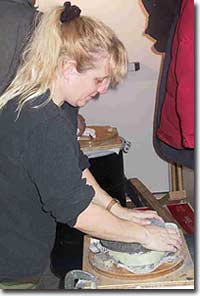Kris Larsen

Kris Larsen working on an experiment
If you were to attend one of Kris Larsen’s classes, you might hear her describing the magnetic fields on the sun as a giant magnetic hernia. On another day, she might be comparing the shape of the universe to a Pringle’s potato chip, or spinning around doing the “pulsar dance” to simulate a rapidly rotating neutron star. And in a class on science and society, she’s discussing creation myths in Tolkien’s Lord of the Rings.
“I always use very colorful analogies to bring home what are sometimes very obscure, theoretical, hard-to-grasp concepts,” says Larsen, a professor of physics and astronomy at Central Connecticut State University. Her passion and enthusiasm in the classroom earned her the 2002 Excellence in Teaching Award at CCSU, and the honor of being named a “Great Professor of Connecticut” by the Hartford Courant newspaper.
Where does she get these zany analogies? Even she doesn’t know. “I think of the weirdest things on-the-fly. All of a sudden, I’m in the middle of a lecture, and it just hits me. I don’t know where I pull half this stuff, but it just sort of comes up.”
Larsen, who has tattoos and an eyebrow piercing and listens to heavy metal music, may not look like a typical physics professor, but she’s happy being different. “I haven’t had any problems being non-conventional in my profession. I was ‘Class Individualist’ in high school. I have always been off the wall. That’s not been a problem for me,” she says.
What has been more of a problem is being a woman in a heavily male-dominated field. Larsen says she’s always had to work harder to be taken seriously.
As an undergraduate at Central Connecticut State University—where she is now a professor—she was one of two female physics majors. “The boys started giving us crap at first, until they figured out that we got the best grades in the classes,” she recalls. “So even then it was the drive to excel more than the boys. You had to prove yourself.”
In graduate school, at the University of Connecticut, Larsen ran into similar problems. Many people just didn’t believe that the short, blond, vivacious young woman was a physicist. She’s been mistaken for a secretary, or someone’s wife or girlfriend. Students looked at her like she was lost when she attended a quantum mechanics class. One Nobel Prize-winning physicist (who she says will remain nameless) even ignored her attempts to ask a technical question about his lecture because he assumed she was just someone’s girlfriend.
When Larsen went to physics conferences with her thesis advisor, Ronald Mallett, an African American, “people would knock themselves over staring at us. We would walk in the room, and we’d look like freaks compared to everybody else.”
As a teaching assistant, she felt she had to go out of her way to establish herself as an authority figure. Now that she’s a full professor and a bit older—she’s 40—Larsen says she finds it easier to get respect.
But she still wants the students to know she’s human, so they feel comfortable in her class. “I’m human, you’re human,” she tells her class, “We’re in this learning experience together. Let’s have some fun. Let’s learn some science.”
In addition to a heavy teaching load, Larsen often takes on administrative duties. She says she’s asked to be on a “zillion” committees, she runs the university’s honors program, and she holds public observing events. Larsen also does some research into the history of science, as well as science and society issues, especially relating to women in science.
When she’s not teaching astronomy, she’s doing it. An avid amateur astronomer, Larsen recently ground her first telescope mirror, quite an achievement for a theoretical physicist who’s all thumbs, she says proudly. Now she just has to build a telescope to put it in.
All of these activities don’t leave Larsen any time for pure physics research. In graduate school she carried out theoretical studies of black holes. Now she feels she’s proved she can do that kind of work, and is happy with her choice to focus on teaching. ”I’m not going to win a Nobel Prize, and I’m really okay with that,” she says. “Perhaps one of my students will, and that would be more than prize enough.”











